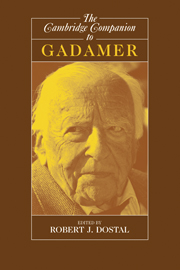Book contents
- Frontmatter
- Introduction
- 1 Gadamer
- 2 Gadamer’s Basic Understanding of Understanding
- 3 Getting it Right
- 4 Hermeneutics, Ethics, and Politics
- 5 The Doing of the Thing Itself
- 6 Gadamer on the Human Sciences
- 7 Lyric as Paradigm
- 8 Gadamer, the Hermeneutic Revolution, and Theology
- 9 Hermeneutics in Practice
- 10 Gadamer’s Hegel
- 11 Gadamer’s Relation to Heidegger and Phenomenology
- 12 The Constellation of Hermeneutics, Critical Theory, and Deconstruction
- Bibliography
- Index
5 - The Doing of the Thing Itself
Gadamer’s Hermeneutic Ontology of Language
Published online by Cambridge University Press: 28 May 2006
- Frontmatter
- Introduction
- 1 Gadamer
- 2 Gadamer’s Basic Understanding of Understanding
- 3 Getting it Right
- 4 Hermeneutics, Ethics, and Politics
- 5 The Doing of the Thing Itself
- 6 Gadamer on the Human Sciences
- 7 Lyric as Paradigm
- 8 Gadamer, the Hermeneutic Revolution, and Theology
- 9 Hermeneutics in Practice
- 10 Gadamer’s Hegel
- 11 Gadamer’s Relation to Heidegger and Phenomenology
- 12 The Constellation of Hermeneutics, Critical Theory, and Deconstruction
- Bibliography
- Index
Summary
No one would disagree that the consideration of language stands at the center of Gadamer's philosophical hermeneutics. Truth and Method makes this obvious. Whoever follows the discussions and descriptions in the first two parts of the book can only affirm the logical development that leads to the consideration of language. As the work develops, we find again and again the principal theme to be the understanding: “the phenomena of understanding and of the correct interpretation of what has been understood” (TM 1). The historically effective consciousness, for which the “historicity of the understanding” is to be shown as a hermeneutical principle, is above all the history of transmitted texts. The relationship of the text and the interpreter is always a “conversation”; the logic of which is the “logic of question and answer.” All these concepts, central to Gadamer's hermeneutics, point to forms of language, which can only be satisfactorily clarified in a treatment of its linguisticality.
- Type
- Chapter
- Information
- The Cambridge Companion to Gadamer , pp. 102 - 125Publisher: Cambridge University PressPrint publication year: 2002
- 18
- Cited by

